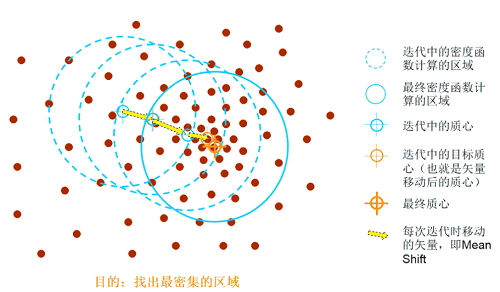Mean Shift Clustering
Feature Description
Mean Shift Clustering (Means Shift algorithm) is a clustering algorithm based on iterative computation of cluster centers. Unlike K-Means clustering, it does not require predefining the number of clusters K. The principle involves: starting from initial cluster centers, continuously searching for new cluster centers along the direction of increasing point density within the bandwidth until termination criteria are met. The termination criteria occur when the displacement distance between consecutive cluster centers becomes negligible during iteration, or when the maximum iteration count is reached (default: 300 iterations).

Parameter Description
| Parameter | Default Value | Description | Parameter Type |
|---|---|---|---|
| Source Dataset | Specifies the vector dataset to be analyzed, supporting point datasets. | DatasetVector | |
| Target Datasource | Specifies the datasource storing the result dataset. | Datasource | |
| Result Dataset Name | Specifies the name of the result dataset. | String | |
| Bandwidth | -1 | The search radius centered around cluster centers, measured in coordinate system units (value > 0). Default -1 triggers automatic bandwidth calculation. Clustering results are bandwidth-sensitive: small bandwidth causes slow convergence and excessive clusters; large bandwidth may cause cluster loss. | double |
| Custom Initial Cluster Center Seed Points | Custom initial cluster centers. Not set by default. Format: [{"x":0.0,"y":0.0},{"x":9.0,"y":9.0}] | Point2Ds |
Output
- Adds a Cluster_ID field in the source dataset to indicate the resulting cluster categories.
- Generates a vector dataset representing final cluster center points.



